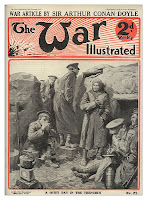
As I watched David Niven and friends puffing away on their fags last night on The Pink Panther, I was reminded how common it was to smoke not so long ago. But smoking has largely gone the way of haberdashery. Well, good riddance...even though you wouldn't know it in New York City. But whereas a fine hat is glorifying to God in the beauty of its style, cigarette smoking is a violation of the sixth commandment (look it up; Exodus 20:1-17).
That aside, I am unaware of anything unwholesome in the enjoyment of a pipe or cigar...unless of course your wife objects to the smell.
Consider this pious meditation on smoking by Ralph Erskine (Scottish Presbyterian minister, 1685-1752).
Smoking Spiritualized
In Two Parts. The first Part being an old Meditation upon Smoking Tobacco;
the second, a new Addition to it, or Improvement of it.
Part One: The LawTHIS Indian weed now wither'd quite,
Tho' green at noon, cut down at night,
Shows thy decay;
All flesh is hay.
Thus think, and smoke tobacco.
The pipe, so lily-like and weak,
Does thus thy mortal state bespeak
Thou art ev'n such,
Gone with a touch.
Thus think, and smoke tobacco.
And when the smoke ascends on high,
Then thou behold'st the vanity
Of worldy stuff,
Gone with a puff.
Thus think, and smoke tobacco.
And when the pipe grows foul within,
Think on thy soul defil'd with sin;
For then the fire,
It does require.
Thus think, and smoke tobacco.
And seest the ashes cast away;
Then to thyself thou mayest say,
That to the dust
Return thou must.
Thus think, and smoke tobacco.
Part Two: The GospelWAS this small plant for thee cut down!
So was the Plant of great renown;
Which mercy sends
For nobler ends.
Thus think, and smoke tobacco.
Doth juice medicinal proceed
From such a naughty foreign weed?
Then what's the power
Of Jesse's flower?
Thus think, and smoke tobacco.
The promise, like the pipe, inlays,
And by the mouth of faith conveys
What virtue flows
From Sharon's rose.
Thus think, and smoke tobacco.
In vain th' unlighted pipe you blow;
Your pains in outward means are so,
Till heav'nly fire
The heart inspire.
Thus think, and smoke tobacco.
The smoke, like burning incense, tow'rs;
So should a praying heart of yours,
With ardent cries,
Surmount the skies.
Thus think, and smoke tobacco.
Of course, Erskine is writing about pipe tobacco. The nineteenth century saw the rise of the cigar, and the cigarette is largely a twentieth century craze.
SmokingLungs.com gives us this brief history of the cigarette.
In the nineteenth century, tobacco was smoked by gentlemen only in the form of cigars. Cigarettes, which were basically the sweepings off the floor of the cigar factory, were only smoked by the very poor.
As machines to mass produce cigarettes came into the fore in the 1880s, smoking cigarettes became more common but the number of cigarettes smoked was still, relatively small. During World War I tobacco companies gave away free cigarettes to millions of soldiers, and it was only after the war that large numbers of Americans smoked cigarettes.
Since there is a time lag of approximately 20 to 30 years between the onset of smoking and the development of lung cancer, the damage done was not immediately apparent. Doctors were surprised to see a sudden epidemic of lung cancer cases in the 1930s. They quickly discovered the association between smoking and lung cancer. Large statistical studies in England and the United States in the 1950s (Doll and Hill, Cutler) conclusively proved beyond any shadow of a doubt that cigarette smoking markedly increased the chances of developing lung cancer.
By the 1970s, lung cancer had gone from one of the rarest of cancers to the number one killer cancer in the Western world.
Thomas Addison, M.D., shares this little gem of information. In 1900, "Smoking is primarily a male habit and most smokers choose cigars. Smoking cigarettes is considered pedestrian and unmanly." World War I was the turning point for cigarette popularity, however.
During World War I cigarettes become the smoke of choice as pipes and cigars prove unmanageable at the front. Between 1910 and 1919 cigarette production increases by 633% from under 10 billion/year to nearly 70 billion/year, and cigarette smoking begins to become fixed among American men. The American Red Cross and the Young Men's Christian Association, previously opposed to the propagation of cigarettes, actively supply them to the troops overseas.
Here is a bibliography on the history of cigarette smoking.
There is no rational defense for cigarette smoking. It is a form of slow suicide. It enslaves your will, squanders your money, poisons your neighbors, and fouls the air. It is a sinful misuse of God's creation and a wreckless disregard for the value of the few precious years he has given you.














